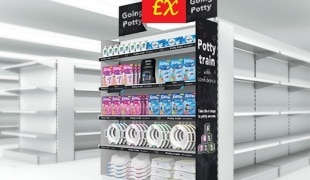The cost of food is rising – on average we’ve spent an extra £27 per household in the past 12 weeks here in the UK (which equates to over £120 per household this year).
And post Brexit the cost of goods overall has risen by an average of 2.3% compared to this time last year, with costs expected to keep rising.
What are shoppers doing to save money? And how are the retailers helping us?
Over the past 12 months, there’s been a distinct trend of shoppers moving more and more towards own brand products – choosing cost efficiency over brand loyalty. According to recent research by Retail Economics, 48% of 2,000 consumers questioned said they would switch to cheaper own-label alternatives if their weekly food shopping bills rose by 3%.
Mirroring the big 4, retailers such as Aldi and Lidl primarily stock own label product, with bigger brands entering stores on a ‘WIGIG’ basis (When It’s Gone It’s Gone). By doing so they’ve seen a year on year spend increase - 19% and 18% respectively 2016 to 2017 - with an estimated 60% of the population now shopping with these two retailers regularly. These retailers offer less choice, but in doing so they can keep costs down while still offering what the shoppers are looking for.
To compete, Tesco are also cutting down on their ranges of branded products across the board by restricting the brands and where they purchase from. By doing so they create simpler supply chains and cut costs, making savings they can then pass on to the shopper.
Supermarkets are also realising that to compete with cheaper retailers they need to find a proposition for their own brands that isn’t just about price. By rebranding their own label products, retailers are essentially creating an own brand that isn’t immediately obvious as a budget, own label product. For example, Tesco are rebranding their own label fresh products away from its ‘Everyday Value’ messaging in a bid to appear more premium and therefore give the impression of better value for money. There are 7 new labels across a variety of fresh products such as own label beef, which now appears as the brand ‘Boswell Farm’, and own brand salad labelled as ‘Nightingale Farm’.
With shoppers turning more towards own brand products what impact does this have on the big brands?
Big brands are having to find other ways to pique our interest and prove that they are worth paying more for. Whilst price cutting is a great temporary measure to drive trial and encourage shoppers to purchase, it isn’t sustainable. Brands need to not only engage with shoppers but also get them to buy it at the normal price, which is inevitably more expensive than own label.
Brands prove their worth by shouting about their points of difference, proving they are worth paying more for. And one thing we know shoppers are willing to pay for is the ‘healthier’ option. Brands have cottoned on to this and are pushing out ‘healthier’ options of well-known products to keep hold of their customers. Just look at Coca-Cola, who launched not one but two products in a bid to keep customers in an increasingly sugar conscious world, or Heinz who boast ‘50% less sugar, 50% less salt, 100% Heinz taste’. What’s to argue with? We can spend more money and be healthier!
Another thing that brands have twigged is that not only are we concerned with our own health but we’re also concerned with the health of the world around us. Can we shop and help the planet at the same time? Apparently we can, according to brands such as Velvet (plants trees), Pampers (vaccinations for babies) and Kelloggs (free books). By purchasing big brand products, we can spend more AND help mankind. Brands are tapping in to the desire from shoppers to justify spending more on products, and not just because it might be a better-quality product, but they want to feel ethically good too.
As household costs continue to go up, shoppers are looking to save money. So, it makes sense that one of the first and easiest places we can look to save money is our weekly shop. In my own shop, switching from a branded to non-branded soft drinks product saved me over £15 a month! It’s an easy area where we can quickly influence change. It’s trendy too…. who doesn’t love to brag about their bargains these days? And with shows such as ‘Eat Well For Less’ and ‘Supershoppers’ gracing our screens we know the general public are interested in learning about clever ways to save money. Whilst there will always be brands that people aren’t willing to compromise on – whether you grew up with them, are used to their taste or just agree with the brands politics – shoppers are now more willing to compromise in order to save some pennies. So with this in mind supermarkets are fighting harder than ever for our cash.



